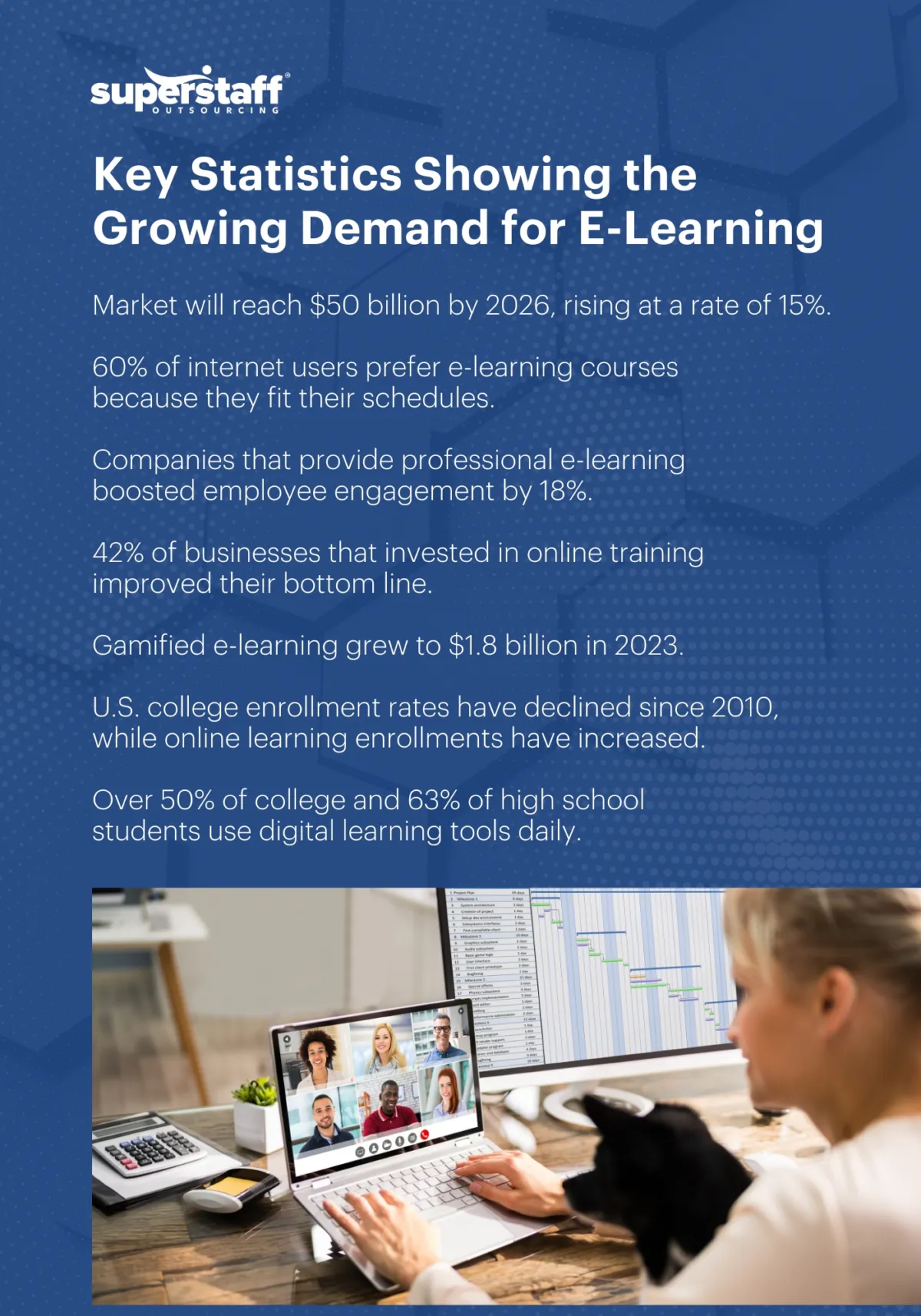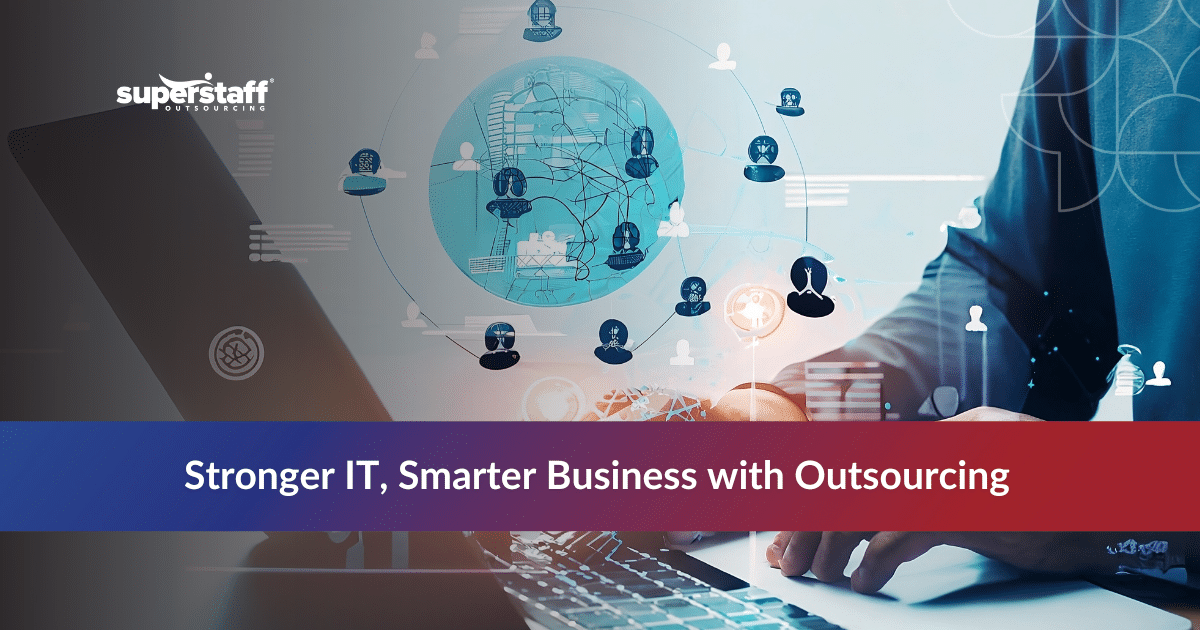
E-learning allows individuals to gain specialized knowledge and skills without leaving the comfort of their homes. Businesses have begun using e-learning solutions to invest in their employees’ professional development.
For these reasons, the e-learning industry has gained significant momentum, with many providers struggling to keep up with the continually growing consumer demand.
If you’re hoping to scale your e-learning business but don’t have the in-house capability to grow without disruption, working with an outsourcing provider can be your best bet. By taking on customer service, administrative support, and other back-office roles, your BPO partner can help you meet rising demand while keeping costs under control.
This article will examine the industry’s current state and how an e-learning outsourcing vendor can help address the sector’s most pressing challenges. Let’s dive in!
The Global E-Learning Market is Sky-Rocketing in Demand
Corporate Clients Lead the Way in E-Learning Adoption
Industry experts foresee the global e-learning market for corporate clients will be valued at $50 billion in two years as more companies use online training courses for employee upskilling. Between 2020 and 2026, the market is projected to rise at an annual rate of 15%.
Gamified Experiences Are Becoming the Norm
Although businesses are leading the way in adopting e-learning platforms, individual consumers are also driving up demand for online courses, particularly for “gamified learning experiences.”
A market report on Gamification in Education found that the market size for gamified e-learning grew to $1.8 billion in 2023. Learners are more motivated to study the materials when the e-learning platforms treat courses as a “game” (i.e., rewards are given out for unlocking milestones, or users are given digital badges to show off their training achievements).
The Rise of Mobile Learning Is Shaping the Industry
In the past, users chose to access online courses through computers or laptops, but today, more consumers are turning to mobile devices. In fact, industry analysts reported that the mobile learning market expanded to $38 billion in 2020, growing at a CAGR of 36.3%.
One Towards Maturity study echoed these findings, stating that 50% of smartphone users download apps for e-learning purposes. Among these learners, 64% agree that mobile devices are essential tools for accessing online training.
More Students Are Using Online Courses to Learn and Upskill
Americans are becoming increasingly disenchanted with traditional schooling, mainly due to high university expenses – especially MBA degrees which cost about $31,300 a year – and the inaccessibility of student loans. As such, many seek alternative ways to gain the learning and development they need to compete in the labor market.
According to a Taylor & Francis study, over 30% of U.S. students enroll in an online course annually. In the past 14 years, college enrollment rates in the United States have steadily declined while enrollments in online learning platforms have increased significantly.
Meanwhile, a recent Statista report found that 66% of Americans are familiar with e-learning services. Over half of all college students agree that online platforms have made education more accessible, and 63% of high school students use digital learning tools daily.
Why Do Students Prefer E-Learning?
According to a Forbes study, online courses improve retention rates by 25% to 60% because they give students more control over their learning process. Other studies suggest that online learning allows individuals to learn five times more material in less time than traditional classes. Many students actively visit online tutoring classes on various subjects, for example, they might have a math program online with well-built learning system.
A different survey found that 60% of internet users prefer enrolling in e-learning courses because they better fit their personal lifestyles and schedules. In an Online Education Trends Report, 96% of students who completed their online degree program stated that they reaped a positive return on their investment.
Because of the growing popularity of online education among students, colleges are starting to diversify their teaching methods, leading to the growth of the Massive Open Online Course (MOOC) market. Out of 25 top universities in the United States, 22 now offer free online courses.
Businesses Are Using E-Learning to Invest in Their Workforce
As mentioned above, corporate clients readily adopt e-learning platforms to empower their employees and upgrade their skills. It’s a win-win for companies and workers, resulting in higher employee productivity and engagement and increased business competitiveness.
A KPMG research study found that 95% of workers value online courses because they learn new knowledge privately, while 84% enjoy upskilling without traveling. Companies that provided professional e-learning opportunities also boosted employee engagement by 18%.
Of course, individual workers aren’t the only ones who benefit from e-learning courses. Businesses experience increased profitability after investing in their workforce’s training and development, with over 42% saying they grew their revenue and improved their bottom line.
E-Learning Outsourcing to a Call Center in the Philippines: What Are the Roles You Can Delegate Offshore?
Now that we’ve discussed the state of the e-learning sector today, let’s discuss how outsourcing can help companies navigate industry challenges. Building an effective online education platform requires careful planning across different departments.
For instance, your IT and software services specialists must work closely with customer experience professionals who can help you craft a UX strategy that meets your target market’s needs and preferences. At the same time, you need to scale your operations according to growing consumer demand, which can be difficult when you keep everything in-house.
By working with e-learning outsourcing companies, you can focus on your main business while ensuring that dedicated offshore professionals handle all other non-core functions. Here are a few roles you can delegate to an experienced call center in the Philippines:

Customer Service
As soon as a customer starts using your online learning platform, a support team must be available to guide them through the end-to-end process. Remember: Every interaction with a user can impact customer loyalty and satisfaction, ultimately fueling your bottom line.
A dedicated 24/7 offshore customer support team can give your customers the high-quality service they deserve. They ensure that users have someone to talk to when they need help navigating your e-learning platform or have inquiries about available online courses.
Omnichannel and Multilingual Support: Going Above and Beyond for a Seamless E-Learning Experience
Customer service is only one part of the overall user experience. To create a positive, seamless, and hassle-free learning journey for your target market, give them the option to reach you where they feel most comfortable while using the language they prefer.
With today’s consumers using multiple platforms to contact customer support, omnichannel capabilities are critical for success in the e-learning industry. Make sure your team can answer client questions via phone, live chat, social media, email, or any other platform they choose.
Additionally, e-learning platforms often serve customers from all over the world and across different time zones. Investing in multilingual customer service is necessary for your users to receive much-needed guidance in their preferred language, helping prevent frustration, misunderstandings, and miscommunications.
Software Development
In e-learning, outsourcing development has emerged as an excellent strategic alternative to in-house software services. Before launching a digital education platform, you must work with qualified software developers who can turn programming code into a fully functional website or application.
Whether you’re hoping to create an interactive virtual classroom environment or an asynchronous learning course, the right developers can accelerate your product launch timeline and create engaging sites or applications that meet your goals.
Outsourced software developers also know how to create a user-friendly interface that is easily accessible and can be utilized by individuals from various backgrounds, such as students, business owners, employees, or anyone looking to learn new skills.
IT and Technical Support
Despite the best efforts of your software development team, some users will still encounter problems with your website or application. With a dedicated IT and technical support team, e-learning vendors can ensure that customers can get assistance when they come across technical issues and bugs.
Your tech support specialists can help users easily access online courses and resolve bugs quickly. They may also note the most commonly reported customer issues and work closely with software developers to recommend improvements or new features to enhance the platform’s overall UX and performance.
Virtual Assistant Services
Running an e-learning business is no easy task. Providers juggle a wide range of roles and responsibilities, including overseeing e-learning development, maintaining and monitoring their online platform, constantly searching for ways to improve user experience, and scaling operations to accommodate growing demand.
Outsourced virtual assistants from a call center in the Philippines can lend much-needed administrative support to these busy company leaders. They can handle tasks like data entry, research, email, and social media management, lightening your workload while supporting your core operations.
Accounting and Bookkeeping
Finally, e-learning businesses must not forget to invest in their accounting and finance departments. Overseeing finances will help you allocate funds and resources to the proper departments, maintain profitability, and achieve sustainable growth.
Armed with years of experience handling finance functions, outsourced accountants and bookkeepers closely monitor your e-learning company’s financial health, ensuring that expenses are controlled and profits are maximized. They are also responsible for helping your business comply with tax regulations and avoid hefty fines.
Let SuperStaff Be Your E-Learning Outsourcing Partner
As your e-learning company grows, you’ll need the help of outsourcing professionals to improve performance and productivity without incurring a mountain of costs. If you’re ready to scale your business, why not outsource your e-learning non-core functions to the BPO professionals at SuperStaff?
SuperStaff offers comprehensive outsourcing solutions, including customer-facing functions, back-office support, and even specialized call center services. No matter your particular needs, we can connect you with a vast talent pool of offshore professionals who can get the job done.
Contact us today to discuss how our BPO solutions can empower your e-learning business!







